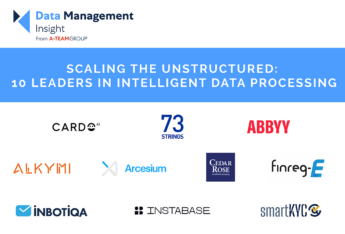Reframing Corporate KYC: Encompass Targets Back-Book Exposure with Scalable EC Review
For many SME focussed banks, KYC investments have streamlined the onboarding journey but legacy KYC records – the back-book – often remain dormant until a regulatory inspection, or an enforcement case at a peer institution, forces a wholesale review. The challenge that follows is how to remediate at scale, with urgency, and without the need...
SimCorp Opens Axioma Factor Research Library to Quant Investors
SimCorp has introduced the Axioma Factor Library Suite, giving quantitative investors access to a broad set of proprietary equity and macro factors derived from the research underpinning its Axioma risk models. The dataset is aimed at hedge funds, systematic investors and asset managers seeking to expand the signal universe available for portfolio construction and strategy...
LSEG Launches Model-as-a-Service, Extending Marketplace Strategy into Financial Models
LSEG has launched Model-as-a-Service (MaaS), expanding its marketplace strategy beyond data distribution into the hosting, commercialisation and integration of financial models. At launch, Societe Generale has joined as a provider, making fixed income, FX, ESG and equities analytics available through the platform. The move positions LSEG not just as a data vendor, but as an...
Sphinx Targets 24/7 Energy Markets with Blockchain-Enabled Derivatives Exchange
A new entrant to the energy derivatives landscape is preparing to test whether modern trading infrastructure can reshape how energy risk is managed. Sphinx, a startup exchange operator, is developing a platform designed for continuous trading and near-instant settlement in energy derivatives, initially targeting U.S. natural gas and electricity markets. The Sphinx Global Commodity Exchange...
GoldenSource CEO Corrigan Lays Out Three-Year Plan of Change and Innovation
Eighteen months into his stewardship of GoldenSource, chief executive James Corrigan says the company is entering its next phase with a clear, practical three-year plan. Corrigan describes a disciplined approach: decide where the firm will compete, be explicit about what sets it apart, and align the organisation behind a short list of priorities. “If you don’t evolve your business model,...
Bloomberg Transforms Real-Time News into Structured Data for Systematic Workflows
Bloomberg has enhanced its Real-Time News Feeds with new customisable, machine-readable delivery options designed for direct integration into automated trading and risk systems. While framed as a product expansion, the development reflects a broader structural shift: narrative news is increasingly being positioned as a structured, real-time data asset within systematic investment architectures. The new feeds...
Challenging the Status Quo: Re-imagining the Trading Desk for 2026 and Beyond
The opening session of A-Team Group’s recent TradingTech Summit Europe set a pragmatic tone for the discussions that followed. In a fireside chat between Stuart Lawrence, Head of EMEA Equity Trading at UBS Asset Management, and Monika Fernando, Product Leader, FinTech & Digital Platforms and former Head of Global FI Client Data & Analytics at...
Personal Investment Pain Point Sparks Idea for Fast-Growing Wealth Tech Firm Goodfin
Anna Joo Fee had a problem. The Wall Street lawyer was so busy in her job that managing her wealth adequately was difficult. Her options were limited, however. Institutions wanted the capital that high earners could offer, but were not best placed to serve the market. And she wasn’t confident in her own knowledge to...
When 1% Breaks the Fund: The Sanctions Contagion Facing ETF Issuers
Roy Kirby, Head of Core Products at SIX Group, has spent the past four years watching sanctions transform from episodic geopolitical tools into a structural feature of market risk. In sharing insights with RegTech Insight, he sets out how the acceleration and layering of sanctions since 2022 are reshaping compliance obligations for ETF issuers and,...
Scaling the Unstructured: 10 Leaders in Intelligent Data Processing
Huge swaths of critical financial information, from private credit agreements and ESG disclosures to complex tax documentation, is locked in unstructured formats such as digital documents and PDFs. The manual bottleneck this creates for the middle and back office eats into valuable resources. A key means to achieving this, Intelligent Data Processing (IDP), represent a...










